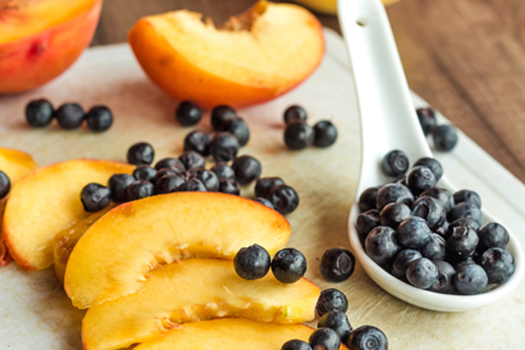Peaches and Berries: Super Foods for Breast Cancer

Women consuming at last two servings weekly of peaches or nectarines saw a stunning 41 percent risk reduction for postmenopausal ER- breast cancer, while those eating at least one serving of blueberries weekly saw a 31 percent risk reduction, according to one of the largest and longest running studies ever made on women’s health as a function of diet.
ER negative breast cancer: worse prognosis but easier to prevent with good diet
Although only about 20 percent of breast cancers are estrogen receptor negative (ER-), they represent a disproportionately high share of breast cancer deaths due to their poorer prognosis compared to ER+ cancers (up to 50 percent greater mortality for Caucasian and 70 percent greater mortality for African American women). Paradoxically, ER- breast cancers may be easier to prevent with a healthy diet than are ER+ cancers. For example, one large study recently showed high vegetable consumers had 18 percent less ER- breast cancer but no protection from the ER+ variant. As a result, much work is being done to further clarify how diet may prevent ER- breast cancer.
Fruit and vegetables for cancer prevention: is selection key?
In this new landmark study, researchers followed the diets of 75,929 postmenopausal women from the Nurses’ Health Study (NHS) cohort starting in 1984. Food frequency questionnaires were sent to participants every four years, yielding dietary data far more detailed and more reliable than what is available in most other similar studies. The results were somewhat surprising: even the women eating the highest amount of fruit and vegetables (nine servings daily in total) saw only marginal protection from ER- breast cancer. Fruit in general offered no protection, even at four servings daily. Vegetables showed a little more promise: women eating the most (5.5 servings daily) experienced 19 percent less ER- breast cancer, but even this was not quite statistically significant.
But researchers have long suspected that there may be a few super foods which offer particularly strong protection from cancer (flaxseed is a good example), and that these protective effects can be lost in the statistics when the super foods are lumped together with all other fruit or vegetables. With this in mind, the researchers in this study separately analyzed the effects of 17 different vegetables and 11 different fruits (or juices) on cancer risk.
Peaches, nectarines and blueberries – the new super foods against ER- breast cancer?
The detailed analysis showed that women eating at least two servings of peaches or nectarines weekly had a 41 percent reduction in ER- breast cancer risk, while those eating at last two servings of berries had 25 percent less ER- breast cancer. The berries category was further subdivided into blueberries and strawberries only. Both were protective, but blueberries were far more potent, reducing risk by 31 percent with at least one serving weekly. For vegetables, only winter squash showed a protective effect (30 percent risk reduction at 2 servings weekly) but this was statistically marginal.
The mechanisms by which peaches, nectarines and berries protect against breast cancer are not fully understood. All are excellent sources of antioxidants. Peaches and nectarines also happen to be good sources of chlorogenic acid, which has been shown in lab studies to potently inhibit ER- breast cancer growth.
Further research will be carried out to uncover exactly how these super foods protect women against ER- breast cancer. But in the meantime, it’s good to know that some selective buying at the fruit section of your local grocery store could make a very meaningful difference in your risk for cancer.
Sources for this article include:
- http://www.edenprescription.com/Flax_seed_Breast_Cancer.html
- http://www.ncbi.nlm.nih.gov/pubmed/23532538
- http://www.ncbi.nlm.nih.gov/pubmed/23349252
- http://www.ncbi.nlm.nih.gov/pubmed/19530711
DISCLAIMER: All information on this website, including research articles, is for information purposes only and is not meant as a recommendation to buy or use any nutritional supplement, healthcare product or service of any type. Ethan Evers does not provide medical advice directly or through recommended or linked materials, articles etc. All matters regarding your health require medical supervision and advice from an appropriately licensed medical practitioner.





